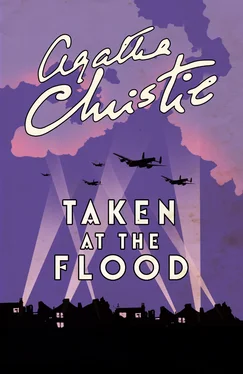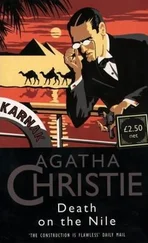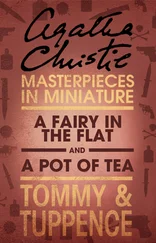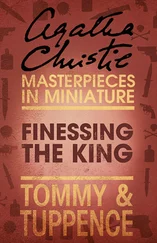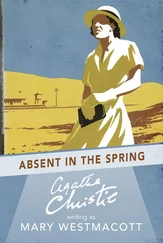She asked: ‘What’s his name?’
‘Hunter. David Hunter. Irish, I believe. Of course they are not people one has ever heard of. She was a widow—a Mrs Underhay. One doesn’t wish to be uncharitable , but one can’t help asking oneself—what kind of a widow would be likely to be travelling about from South America in wartime? One can’t help feeling, you know, that she was just looking for a rich husband.’
‘In which case, she didn’t look in vain,’ remarked Lynn.
Mrs Marchmont sighed.
‘It seems so extraordinary. Gordon was such a shrewd man always. And it wasn’t, I mean, that women hadn’t tried . That last secretary but one, for instance. Really quite blatant . She was very efficient, I believe, but he had to get rid of her.’
Lynn said vaguely: ‘I suppose there’s always a Waterloo.’
‘Sixty-two,’ said Mrs Marchmont. ‘A very dangerous age. And a war, I imagine, is unsettling. But I can’t tell you what a shock it was when we got his letter from New York.’
‘What did it say exactly?’
‘He wrote to Frances—I really can’t think why. Perhaps he imagined that owing to her upbringing she might be more sympathetic. He said that we’d probably be surprised to hear that he was married. It had all been rather sudden, but he was sure we should all soon grow very fond of Rosaleen (such a very theatrical name, don’t you think, dear? I mean definitely rather bogus). She had had a very sad life, he said, and had gone through a lot although she was so young. Really it was wonderful the plucky way she had stood up to life.’
‘Quite a well-known gambit,’ murmured Lynn.
‘Oh, I know. I do agree. One has heard it so many times. But one would really think that Gordon with all his experience—still, there it is. She has the most enormous eyes—dark blue and what they call put in with a smutty finger.’
‘Attractive?’
‘Oh, yes, she is certainly very pretty . It’s not the kind of prettiness I admire.’
‘It never is,’ said Lynn with a wry smile.
‘No, dear. Really, men —but well, there’s no accounting for men! Even the most well-balanced of them do the most incredibly foolish things! Gordon’s letter went on to say that we mustn’t think for a moment that this would mean any loosening of old ties. He still considered us all his special responsibility.’
‘But he didn’t,’ said Lynn, ‘make a will after his marriage?’
Mrs Marchmont shook her head.
‘The last will he made was in 1940. I don’t know any details, but he gave us to understand at the time that we were all taken care of by it if anything should happen to him. That will, of course, was revoked by his marriage. I suppose he would have made a new will when he got home—but there just wasn’t time. He was killed practically the day after he landed in this country.’
‘And so she—Rosaleen—gets everything?’
‘Yes. The old will was invalidated by his marriage.’
Lynn was silent. She was not more mercenary than most, but she would not have been human if she had not resented the new state of affairs. It was not, she felt, at all what Gordon Cloade himself would have envisaged. The bulk of his fortune he might have left to his young wife, but certain provisions he would certainly have made for the family he had encouraged to depend upon him. Again and again he had urged them not to save, not to make provision for the future. She had heard him say to Jeremy, ‘You’ll be a rich man when I die.’ To her mother he had often said, ‘Don’t worry, Adela. I’ll always look after Lynn—you know that, and I’d hate you to leave this house—it’s your home . Send all the bills for repairs to me.’ Rowley he had encouraged to take up farming. Antony, Jeremy’s son, he had insisted should go into the Guards and he had always made him a handsome allowance. Lionel Cloade had been encouraged to follow up certain lines of medical research that were not immediately profitable and to let his practice run down.
Lynn’s thoughts were broken into. Dramatically, and with a trembling lip, Mrs Marchmont produced a sheaf of bills.
‘And look at all these,’ she wailed. ‘What am I to do ? What on earth am I to do, Lynn? The bank manager wrote me only this morning that I’m overdrawn. I don’t see how I can be. I’ve been so careful. But it seems my investments just aren’t producing what they used to. Increased taxation he says. And all these yellow things, War Damage Insurance or something—one has to pay them whether one wants to or not.’
Lynn took the bills and glanced through them. There were no records of extravagance amongst them. They were for slates replaced on the roof; the mending of fences, replacement of a worn-out kitchen boiler—a new main water pipe. They amounted to a considerable sum.
Mrs Marchmont said piteously:
‘I suppose I ought to move from here. But where could I go? There isn’t a small house anywhere—there just isn’t such a thing. Oh, I don’t want to worry you with all this, Lynn. Not just as soon as you’ve come home. But I don’t know what to do. I really don’t.’
Lynn looked at her mother. She was over sixty. She had never been a very strong woman. During the war she had taken in evacuees from London, had cooked and cleaned for them, had worked with the W.V.S., made jam, helped with school meals. She had worked fourteen hours a day in contrast to a pleasant easy life before the war. She was now, as Lynn saw, very near a breakdown. Tired out and frightened of the future.
A slow quiet anger rose in Lynn. She said slowly:
‘Couldn’t this Rosaleen—help?’
Mrs Marchmont flushed.
‘We’ve no right to anything—anything at all.’
Lynn demurred.
‘I think you’ve a moral right. Uncle Gordon always helped.’
Mrs Marchmont shook her head. She said:
‘It wouldn’t be very nice, dear, to ask favours—not of someone one doesn’t like very much. And anyway that brother of hers would never let her give away a penny!’
And she added, heroism giving place to pure female cattiness: ‘If he really is her brother, that is to say!’
Frances Cloade looked thoughtfully across the dinner table at her husband.
Frances was forty-eight. She was one of those lean greyhound women who look well in tweeds. There was a rather arrogant ravaged beauty about her face which had no make-up except a little carelessly applied lipstick. Jeremy Cloade was a spare grey-haired man of sixty-three, with a dry expressionless face.
It was, this evening, even more expressionless than usual.
His wife registered the fact with a swift flashing glance.
A fifteen-year-old girl shuffled round the table, handing the dishes. Her agonized gaze was fixed on Frances. If Frances frowned, she nearly dropped something, a look of approval set her beaming.
It was noted enviously in Warmsley Vale that if any one had servants it would be Frances Cloade. She did not bribe them with extravagant wages, and she was exacting as to performance—but her warm approval of endeavour and her infectious energy and drive made of domestic service something creative and personal. She had been so used to being waited on all her life that she took it for granted without self-consciousness, and she had the same appreciation of a good cook or a good parlourmaid as she would have had for a good pianist.
Frances Cloade had been the only daughter of Lord Edward Trenton, who had trained his horses in the neighbourhood of Warmsley Heath. Lord Edward’s final bankruptcy was realized by those in the know to be a merciful escape from worse things. There had been rumours of horses that had signally failed to stay at unexpected moments, other rumours of inquiries by the Stewards of the Jockey Club. But Lord Edward had escaped with his reputation only lightly tarnished and had reached an arrangement with his creditors which permitted him to live exceedingly comfortably in the South of France. And for these unexpected blessings he had to thank the shrewdness and special exertions of his solicitor, Jeremy Cloade. Cloade had done a good deal more than a solicitor usually does for a client, and had even advanced guarantees of his own. He had made it clear that he had a deep admiration for Frances Trenton, and in due course, when her father’s affairs had been satisfactorily wound up, Frances became Mrs Jeremy Cloade.
Читать дальше
